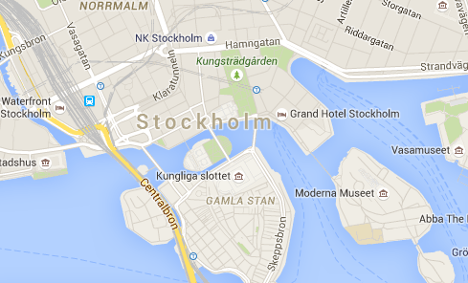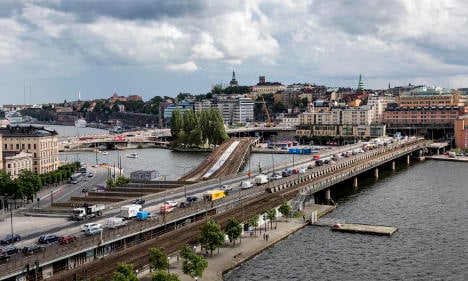Stockholm has previously shunned holding car free days, despite around 200 other cities across Europe embracing the idea of closing off streets as part of European Mobility week, an annual campaign backed by the European Commission that is designed to promote sustainable transport measures.
But this year the Swedish capital will join at least five other towns and cities taking part in the project. Piteå and Lycksele in northern Sweden, Täby north of Stockholm and Älmhult and Varberg in the south have also signed up to go car free for a day in the autumn, with other municipalities also organizing green initiatives during the campaign week.
All roads will be closed in Stockholm's Gamla Stan (Old Town), which is already partly pedestrianized, as well as many of the busy shopping streets around the central station and several of the city's major bridges.

Most of this area will go car free in September. Image: Googlemaps
The Swedish capital already has a global reputation for having cleaner air and fewer vehicles on its streets than most other European cities and was given the first European Green Capital award in 2010 by the European Commission. It has an extensive public transport system including a late-running subway and 24-hour buses.
But the Head of Stockholm's traffic division, local Green Party politician Daniel Helldén told The Local on Monday that “a new approach” was needed to make sure the city could continue to meet air quality standards, limit carbon emissions and improve accessibility during a time of rapid expansion and immigration to the Swedish capital.
“As the city expands, we need new thinking in order to increase accessibility and reach our climate goals…We have a new governance in Stockholm and we’re pushing the prioritization of walking, cycling and public transport hard,” he explained.
“By closing the streets to cars for one day we can give an idea of how our beautiful city looks with less car traffic. We hope that the citizens of Stockholm will be inspired to choose alternative modes of transport instead of the car.”
Last month a global index looking at cycling in urban environments named Malmö in southern Sweden the sixth most bike-friendly city in the world while criticizing Stockholm and Gothenburg for not pushing themselves far enough in terms of innovation or political will.
Helldén said that as well as the car free day in Stockholm, the city would host events throughout the week designed to showcase alternative cycling products and initiatives such as electric bikes and cycles with in-built wagons for transporting small children or making deliveries.
Despite admitting that his wife owned a car which he sometimes drove, Helldén told Swedish newspaper Dagens Nyheter that he also planned to use the week to generate discussions about limiting car use in the Swedish capital. He said that he wanted more Stockholmers who own cars purely for occasional use to consider joining carpooling schemes instead.
“Most Stockholmers need a car at some point, but they shouldn't have to keep one parked without it being used for a long period of time.”


 Please whitelist us to continue reading.
Please whitelist us to continue reading.